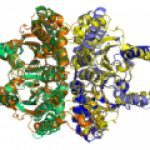Link to Pubmed [PMID] – 12384581
Nucleic Acids Res. 2002 Oct;30(20):4351-60
Chlamydiaceae are obligate intracellular bacterial pathogens characterized by a wide range of vertebrate host, tissue tropism and spectrum of diseases. To get insights into the biological mechanisms involved in these differences, we have put forward a computational and experimental procedure to identify the genome recombination hotspots, as frequent sequence variation allows rapid adaptation to environmental changes. We find a larger potential for recombination in Chlamydophila pneumoniae genomes as compared with Chlamydia trachomatis or Chlamydia muridarum. Such potential is mostly concentrated in a family of seven previously uncharacterized species-specific elements that we named ppp for C.pneumoniae polymorphic protein genes, which have the potential to vary by homologous recombination and slipped-mispair. Experimentally, we show that these sequences are indeed highly polymorphic among a collection of nine C.pneumoniae strains of very diverse geographical and pathological origins, mainly by slippage of a poly(C) tract. We also show that most elements are transcribed during infection. In silico analyses suggest that Ppps correspond to outer membrane proteins. Given their species specificity, their putative location in the outer membrane and their extreme polymorphism, Ppps are most likely to be important in the pathogenesis of C.pneumoniae and could represent targets for future vaccine development.

